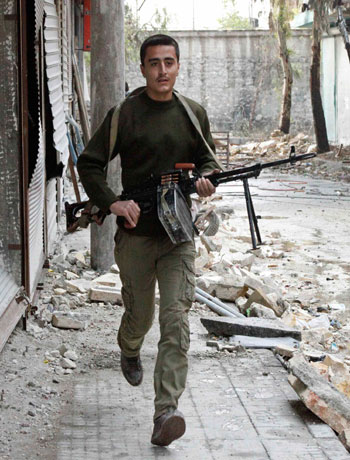
A Free Syrian Army fighter runs at the front line in Aleppo October 25, 2012. Picture taken October 25, 2012. (Reuters)
BEIRUT, (Reuters) – Forces loyal to Syrian President Bashar al-Assad renewed their bombardment of major cities on Saturday and rebels launched several attacks, further undermining a truce meant to mark the Muslim Eid al-Adha religious holiday.
The violence, reported by residents, opposition supporters and Syria’s government, came on the second day of the ceasefire called by international peace envoy Lakhdar Brahimi, who had hoped to use it to build momentum to end the 19-month-old conflict in which an estimated 32,000 people have been killed.
Syrian state news SANA reported dozens of “ceasefire violations” by rebel groups including a car bomb in front of a Christian church in the eastern city of Deir al-Zor.
Activists in Deir al-Zor and in Aleppo, which is Syria’s most populous city and about half controlled by rebels, said mortar bombs were being fired into residential areas.
Residents in Damascus posted internet footage of fighter jets they said bombed the suburbs of Erbin and Harasta. Eight people were killed, according to the residents and to the Syrian Observatory for Human Rights, a British-based opposition organisation with a network of sources within Syria.
It was not possible to verify events due to Syria’s restrictions on media access.
The army has said it agreed to the ceasefire but that it has a duty to respond to rebel attacks.
A commander from the rebel Free Syrian Army said his force would honour the truce but demanded Assad meet opposition demands for the release of thousands of detainees. Some Islamist militants, including the Nusra Front, said they would keep on fighting.
More than 150 people were killed on Friday, including 43 soldiers, said the Observatory for Human Rights. Most were shot by sniper fire or in combat, the Observatory said.
SECTARIAN WORRIES
The conflict pits Assad, whose minority Alawite sect is distantly related to Shi’ite Islam, against mainly Sunni Muslim rebels. Recent attacks, such as Saturday’s bomb by a Syriac church, point to an increasingly sectarian conflict.
The Observatory released a statement on Saturday condemning a clash on Friday in the Aleppo district of Ashrafieh between rebels and an armed wing of the Kurdish Democratic Union Party, which left 30 dead.
“(The fight) threatens dire consequences. It will work in the interests of the regime, which is working hard to incite national sedition and sectarianism,” said Observatory head Rami Abdelrahman.
Syrian state TV said two people were killed in Ashrafieh, after “terrorists” opened fire on a demonstration calling for them to leave the area.
Syrian Kurds have long faced discrimination, a lack of full citizenship rights and forced displacements. But Assad sought to dissuade them from joining the uprising against him that erupted elsewhere in March 2011 by promising citizenship.
About 10 percent of the population, Kurds have been able to exploit an uneasy vacuum left by Assad’s retreating forces to set up their own militia, some with ties to the government.
Rebels in Azaz, a northern Syrian town, reported on their Facebook page that they have detained Lebanese journalist Fidaa Itani. They said Itani, who works for LBCI television, was put under house arrest as his work was “incompatible with the course of the Syrian revolution.”
TRUCE BREACHES
A Reuters cameraman in the Turkish border village of Besaslan in southern Hatay province said he could hear a helicopter circling on the Syrian side of the border, as well as gunfire and explosions.
Turkish ambulances were ferrying wounded people from an unofficial border crossing for treatment in Turkey.
Brahimi’s ceasefire appeal won widespread international support, including from Russia, China and Iran, Assad’s main foreign allies.
The peace envoy’s predecessor, former U.N. chief Kofi Annan, declared a ceasefire in Syria on April 12, but it soon fell apart, along with the rest of his six-point peace plan.
Divided international powers have been unable to stop the violence, with the West condemning Assad but blaming Russia, Iran and China for supporting Damascus.
Russia’s deputy foreign minister Gennady Gatilov tweeted on Saturday that “Westerners” in the United Nations Security Council had prevented the body from condemning a bomb attack in Damascus on Friday, which the Syrian government blames on rebels it labels as “terrorists.”

Free Syrian Army fighters are seen inside a building at the front line in Aleppo October 25, 2012. Picture taken October 25, 2012. (Reuters)

In this image released by the Syrian official news agency SANA , a crowd gather beneath the shattered facade of a building damaged by a car bomb in Damasus, Syria Friday Oct 26 2012. (AP)
